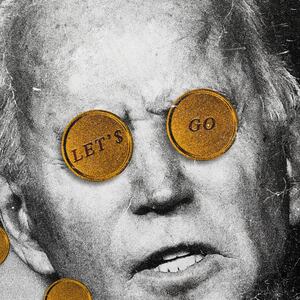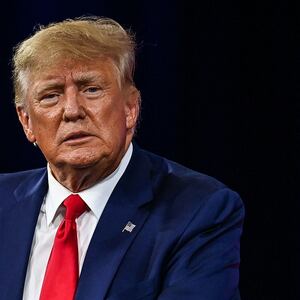A new class-action lawsuit filed by an investor in Trumpworld’s favorite “Let’s Go Brandon” meme coin claims that some of the token’s key players orchestrated a pump-and-dump scheme.
The news marks the latest bit of drama that has plagued the coin since its inception last year and which has persisted since the cryptocurrency relaunched in February. A number of former President Donald Trump’s most loyal fans bought into the crypto hype, only to see the value of their investments plummet.
Attorneys for the plaintiff, an investor in the coin named Eric De Ford, claimed that the token’s executives and insiders “made false or misleading statements” and “disguised their control over the [c]ompany.” Ultimately, the 79-page suit filed in Florida alleges, those insiders “cynically marketed the LGB Tokens to investors so that they could sell off their portion…for a profit,” even as the selloff caused the value of the coin to drop precipitously for the remaining crypto holders.
ADVERTISEMENT
The defendants included the Trumpy hedge funder James Koutoulas, NASCAR, and conservative media personalities Candace Owens and David Harris Jr., among others.
Koutoulas fired back at the allegations in text messages to The Daily Beast. “The plaintiff’s behavior frankly, is disturbing—almost like a stalker,” he wrote.
Koutoulas sent a document that showed apparent email exchanges between De Ford and other individuals affiliated with the coin in February, in which De Ford said he was “inspired by what this token can do for our nation” and offered to help market the coin for free. Evidently his perspective on the coin’s management quickly changed.
“One moment he’s praising our vision and offering to promote the coin, now suddenly, he’s filed a bizarre conspiracy claim,” Koutoulas said.
In a statement, a lawyer representing the plaintiff, Aaron Zigler, sought to rebut Koutoulas’ version of events. “We are disappointed to learn that Mr. Koutoulas would resort to such a misleading characterization of the facts in this case in what appears to be a desperate attempt to continue to prop-up the value of the token and to scare away other defrauded investors from seeking their day in court,” he wrote.
“That a litigant and lawyer like Mr. Koutoulas would expose himself to potential defamation claims and bar discipline in response to being named in a thoroughly researched and well-founded federal lawsuit is consistent with the same poor judgment alleged in the Complaint,” he added.
Some of Trumpland’s most vocal influencers got behind the coin and subsequently were named in the class action suit, including Owens and Harris. Donald Trump Jr.—who has hawked the coin publicly—wasn’t named, however.
“This #ad has one purpose and it’s to let you know that free speech is about to make a major comeback. Stay tuned @letsgo,” Trump. Jr. wrote in an April 7 tweet that garnered over 30,000 likes.
A source close to Trump Jr. with direct knowledge told The Daily Beast that Trump Jr. hasn’t entered into any agreement with the Let’s Go Brandon coin.
Owens billed the lawsuit as a frivolous filing that “borders on hilarity.”
“For starters, I was not paid a single red cent ‘to promote’ the LGB coin,” she told The Daily Beast. “Beyond that, I myself lost money on the coin which removes me unequivocally from any notion of an inside ‘pump and dump’ scheme.”
Harris did not immediately respond to The Daily Beast’s request for comment.
The original Let’s Go Brandon coin was inspired by a televised mishap at a NASCAR race last year. After driver Brandon Brown won the event, the crowd loudly chanted “F*ck Joe Biden,” which an NBC reporter inaccurately relayed as “Let’s Go Brandon.” The slogan soon caught on as a pro-Trump rallying cry and a critique of what his fans perceived as media bias.
For a time, it looked like the cryptocurrency would become an official sponsor of Brown’s NASCAR team, but the deal was ultimately kaboshed. That caused the token’s price to fall, and the class action lawsuit claims that insiders made things worse by selling their stakes. (The suit further alleges that NASCAR didn’t adequately distance itself from the crypto token; the company did not respond to a request for comment as of publication time.)
By February, the coin’s market value had fallen more than 99 percent from its peak—leading a number of its key players to hash out a plan to rebrand and relaunch.
The aggressive marketing strategy hasn’t slowed. Last month, when former President Trump appeared on Harris’ podcast, he was presented with 500 billion of the new Let’s Go tokens by Koutoulas. The value of those coins then stood at a measly $45,000; prices have stayed roughly flat over the past 30 days.
“Sounds good to me!” Trump replied. “I don’t know exactly what it means, but it sounds good to me.” It is unclear whether the former president ultimately accepted the tokens.










